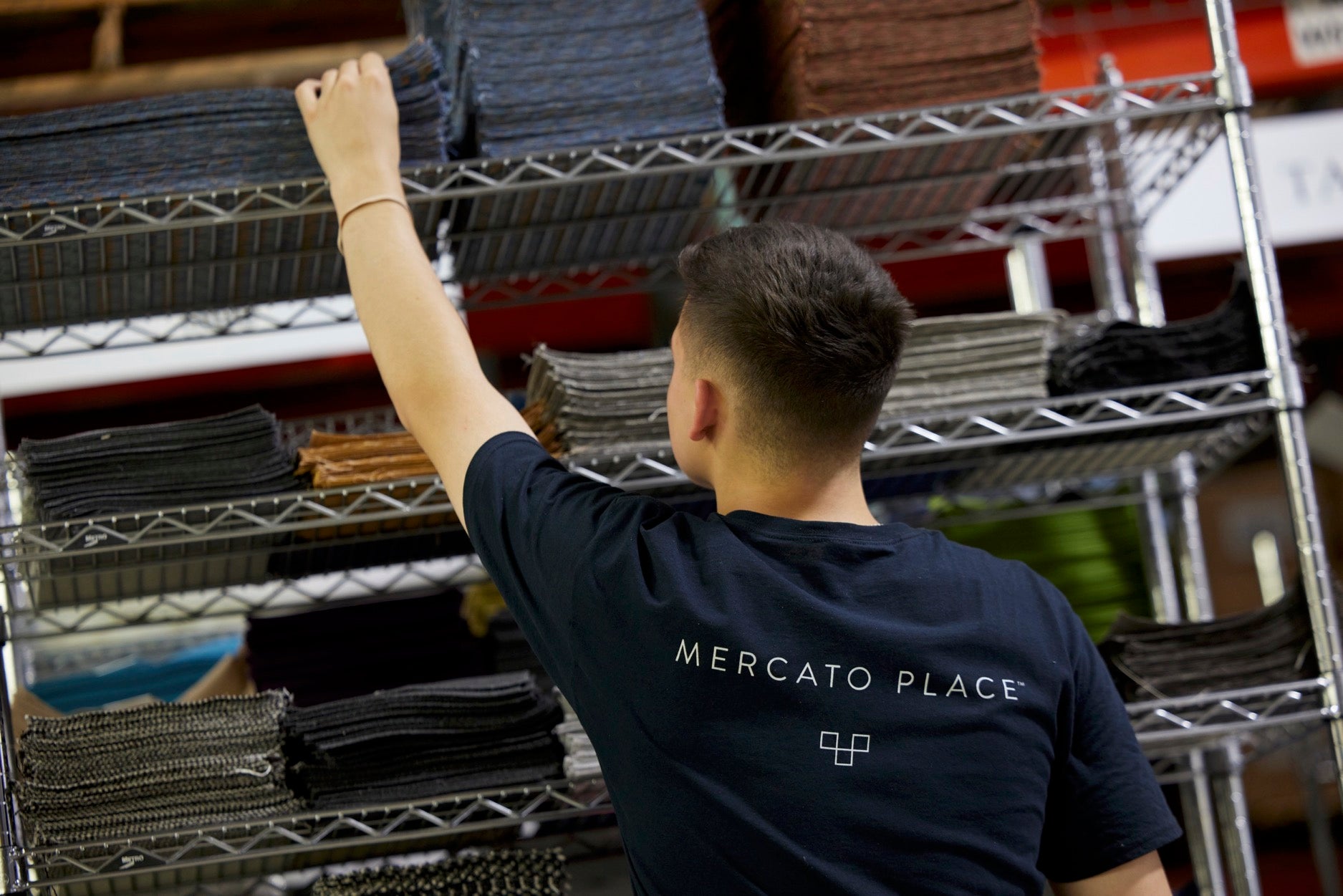Sampling is one of those sticky corners of the design industry, something that everyone relies on but no one is quite happy with. For designers, samples can be an organizational nightmare—and when old memos end up in the dumpster, a source of guilt. For manufacturers, they’re a logistical challenge and a huge expense. No surprise, then, that in recent years, entrepreneurs have been looking to apply a tech-driven approach to disrupt a clunky process and “solve” sampling. Now, a new entrant to the market is making its debut: Mercato Place, an online platform that aggregates textile brands and delivers samples to designers with the click of a button.
For users, the mechanics of the platform are fairly simple. Architects and designers log on to the site and apply for a trade account; once accepted, they can create projects, browse materials and make their selections. Samples are then shipped (ground shipping is the default, though next-day delivery is an option) to designers’ offices or homes in a single box, all free of charge.
Mercato Place is launching with 17 partner brands, which skew toward the contract side of the industry, including Designtex, Mayer Fabrics, Arc-Com, Momentum, Kravet Contract and Valley Forge Fabrics. The materials themselves are primarily fabrics, though the platform also lists wallcoverings and a few specialty categories like acoustic and outdoor materials.

Founder and president Ray Sayers says that he plans to add residential manufacturers and additional categories in the months ahead but the goal of the site is to present a curated, easily digestible selection. “As we get into other [categories], we’ll take the top three to five brands in each of those segments,” he says. “The whole idea is to make it simple and easy to use.”
Mercato Place is a brand-new business built on top of an older one: Sayers is also the owner and president of Thoroughbred, a fulfillment operation based in Zeeland, Michigan, that delivers samples for brands in the contract design industry and for retailers like Pottery Barn and Room & Board. (The company was founded in 1994 and purchased by Sayers in 2004; he’s self-funding Mercato Place.) Working out of a 150,000-square-foot facility, the company is already in the business of delivering samples at scale and speed—Mercato Place simply takes the engine of Thoroughbred and applies it to an aggregated online platform.
The majority of the platform’s brands are already clients of Thoroughbred—clients that had begun reaching out to Sayers in 2021 about developing a sampling alternative to get their products into the hands of architects and designers and generate leads. Indeed, while Mercato Place is going after the trade as its users, in many ways, it was built with manufacturers in mind, with the big-picture goal of becoming a competitor to sampling behemoth Material Bank.
For the uninitiated: Launched in 2019 by Adam Sandow, Material Bank is an online sampling platform that aggregates material samples and ships them overnight to designers and architects from a facility just outside of Memphis, Tennessee (one of the brand’s core concepts: Order by midnight, get the shipment by 10:30 the next morning). In three short years, the company has made a significant impact on the design industry, raising $157 million and signing on roughly 500 brands, whose products range from fabric, flooring and stone to hardware, glass and paint. Material Bank’s user base has also grown considerably. In the spring of last year, the company reported that it had more than 65,000 members with accounts; more recently, a representative estimated the number had grown to over 90,000.
For brands listed on Material Bank, however, the service comes at an expense. In most cases, they pay a monthly cost to have their product listed and a fee to the platform every time a sample of their material is sent in a box to a designer. (Material Bank declined to share the exact cost to brands, but anecdotal evidence from sources who are familiar with the service suggests it’s in the realm of $25 per order.)
Sayers has structured Mercato Place’s fees explicitly in contrast to Material Bank’s. In his system, brands split the cost of the shipment and packaging: If a shipment with five brands in it is $25, each pays $5; if there are only two brands, each pays $12.50, and so on. Sayers also charges brands a monthly fee that ranges from $1,500 to $2,500, which he says is equal to or less than what Material Bank charges. (The platform declined to provide exact figures for its monthly fee.)

Encouraging designers to select ground shipping offers cost savings for brands, a more environmentally friendly option for designers who aren’t in a rush—and perhaps most notably, a pushback against the notion that immediate gratification is always a selling point when it comes to sampling. “Do we really need samples [delivered overnight] for every order we’re working on, every project? I think the answer is no,” says Sayers. “And I think there are more sustainable ways of doing it.” (As a point of comparison, Material Bank defaults to overnight shipping but offers a ground option; the platform also purchases carbon offsets for every shipment it sends out.)
In looking to compete with Material Bank, Sayers faces significant challenges. Sandow’s platform has already achieved considerable scale and breadth across product categories, and has amassed a sizable group of users. The company raised $100 million last year alone, and is making acquisitions, investing in new technology, and looking to expand overseas. It also has the backing of Sandow’s publishing company, which includes Interior Design and Luxe Interiors & Design.
Sayers is taking it one step at a time. Having built a cost structure he hopes will entice brands, the challenge at launch is to attract the designers to sample their materials through the platform. “None of this means anything if we don’t have a really solid impact [with architecture and design firms],” he says. “Everything we are doing from here forward is a push out to them.”
Homepage photo: Courtesy of Mercato Place





























